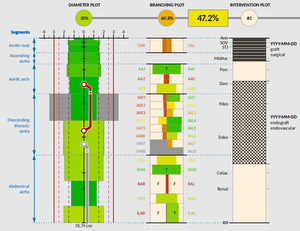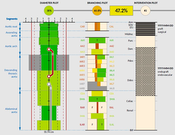Information
- Publication Type: Journal Paper with Conference Talk
- Workgroup(s)/Project(s):
- Date: September 2016
- Journal: Eurographics Workshop on Visual Computing for Biology and Medicine (2016)
- Lecturer: Stefan Bruckner
Abstract
Aortic dissection is a life threatening condition of the aorta, characterized by separation of its wall layers into a true and false lumen. A subset of patients require immediate surgical or endovascular repair. All survivors of the acute phase need long-term surveillance with imaging to monitor chronic degeneration and dilatation of the false lumen and prevent late adverse events such as rupture, or malperfusion. We introduce four novel plots displaying features of aortic dissections known or presumed to be associated with risk of future adverse events: Aortic diameter, the blood supply (outflow) to the aortic branches from the true and false lumen, the previous treatment, and an estimate of adverse event-free probabilities in one, two and 5 years. Aortic dissection maps, the composite visualization of these plots, provide a baseline for visual comparison of the complex features and associated risk of aortic dissection. These maps may lead to more individualized monitoring and improved, patient-centric treatment planning in the future.Additional Files and Images
Weblinks
No further information available.BibTeX
@article{Mistelbauer_Gabriel_2016,
title = "Aortic Dissection Maps: Comprehensive Visualization of
Aortic Dissections for Risk Assessment",
author = "Gabriel Mistelbauer and Johanna Schmidt and A.M. Sailer and
Kathrin B\"{a}umler and Shannon Walters and Dominik
Fleischmann",
year = "2016",
abstract = "Aortic dissection is a life threatening condition of the
aorta, characterized by separation of its wall layers into a
true and false lumen. A subset of patients require immediate
surgical or endovascular repair. All survivors of the acute
phase need long-term surveillance with imaging to monitor
chronic degeneration and dilatation of the false lumen and
prevent late adverse events such as rupture, or
malperfusion. We introduce four novel plots displaying
features of aortic dissections known or presumed to be
associated with risk of future adverse events: Aortic
diameter, the blood supply (outflow) to the aortic branches
from the true and false lumen, the previous treatment, and
an estimate of adverse event-free probabilities in one, two
and 5 years. Aortic dissection maps, the composite
visualization of these plots, provide a baseline for visual
comparison of the complex features and associated risk of
aortic dissection. These maps may lead to more
individualized monitoring and improved, patient-centric
treatment planning in the future.",
month = sep,
journal = "Eurographics Workshop on Visual Computing for Biology and
Medicine (2016)",
URL = "https://www.cg.tuwien.ac.at/research/publications/2016/Mistelbauer_Gabriel_2016/",
}


 image
image Paper
Paper
